The vast majority of the violence committed against federal inmates goes unreported. And it’s a daily occurrence.
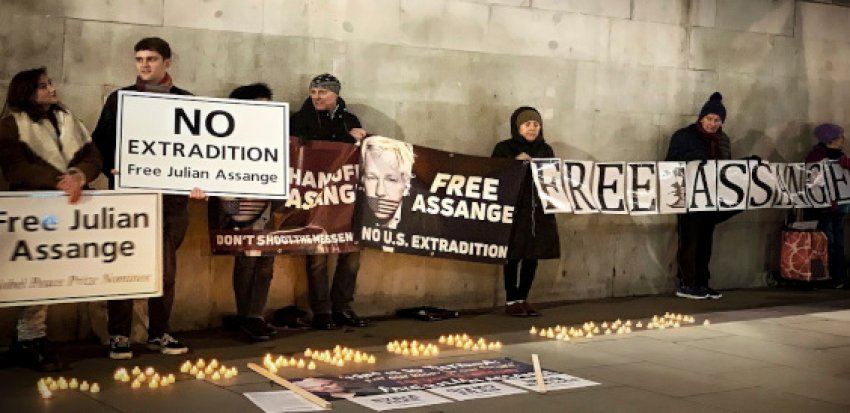
(Garry Knight, CC BY 4.0)
By John Kiriakou
Special to Consortium News
 The federal Bureau of Prisons (BOP) is in a state of chaos. Leadership changes, Covid-19, and criminal activity on the part of BOP officers and staff members has plunged the Justice Department’s largest and best-funded bureau into a scandal that, while it has not made the mainstream media, has harmed thousands of prisoners.
The federal Bureau of Prisons (BOP) is in a state of chaos. Leadership changes, Covid-19, and criminal activity on the part of BOP officers and staff members has plunged the Justice Department’s largest and best-funded bureau into a scandal that, while it has not made the mainstream media, has harmed thousands of prisoners.
[The issue was raised last week in the hearing of Julian Assange in London as the state of mental health care for prisoners, cited in a BOP report, came up in witness testimony in the defense’s argument against sending Assange to the U.S. to face time in a U.S. prison.]
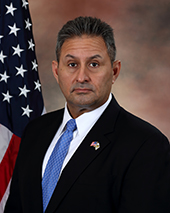
Michael Carvajal, director of Federal Bureau Of Prisons. (BoP)
Since Donald Trump became president, the BOP has seen five different directors. The current director, Michael Carvajal, replaced Kathleen Hawk Sawyer, who also was BOP director under President George H. W. Bush. Sawyer replaced Hugh Hurwitz, who was fired after Jeffrey Epstein died in prison, apparently by suicide. Hurwitz had replaced Mark Inch, who “resigned abruptly” after only a few months on the job in 2018. Hurwitz had succeeded President Barack Obama’s last BOP director, Charles E. Samuels, Jr.
It’s not unusual for senior government bureaucrats to come and go. It is unusual, though, for there to be a parade of bureaucrats who just can’t seem to leave the place in better shape than they found it. In just the past year, the BOP has found itself mired in trouble and controversy that seems to get worse and worse.
Covid-19
First, Covid-19 has ravaged the federal prison system. Literally every prison is affected, and visits have been canceled since March. But that hasn’t stopped prison guards, staff members, contractors, and delivery people from bringing Covid-19 into the system. As of Sept. 15, there were 125,730 confirmed cases of Covid-19 in the federal prison system, resulting in 1,066 deaths. That is an infection rate four times the national average.
Covid-19 did not hit the BOP out of the blue. Its leaders saw it coming just like everybody else did. But they failed to prepare for it.
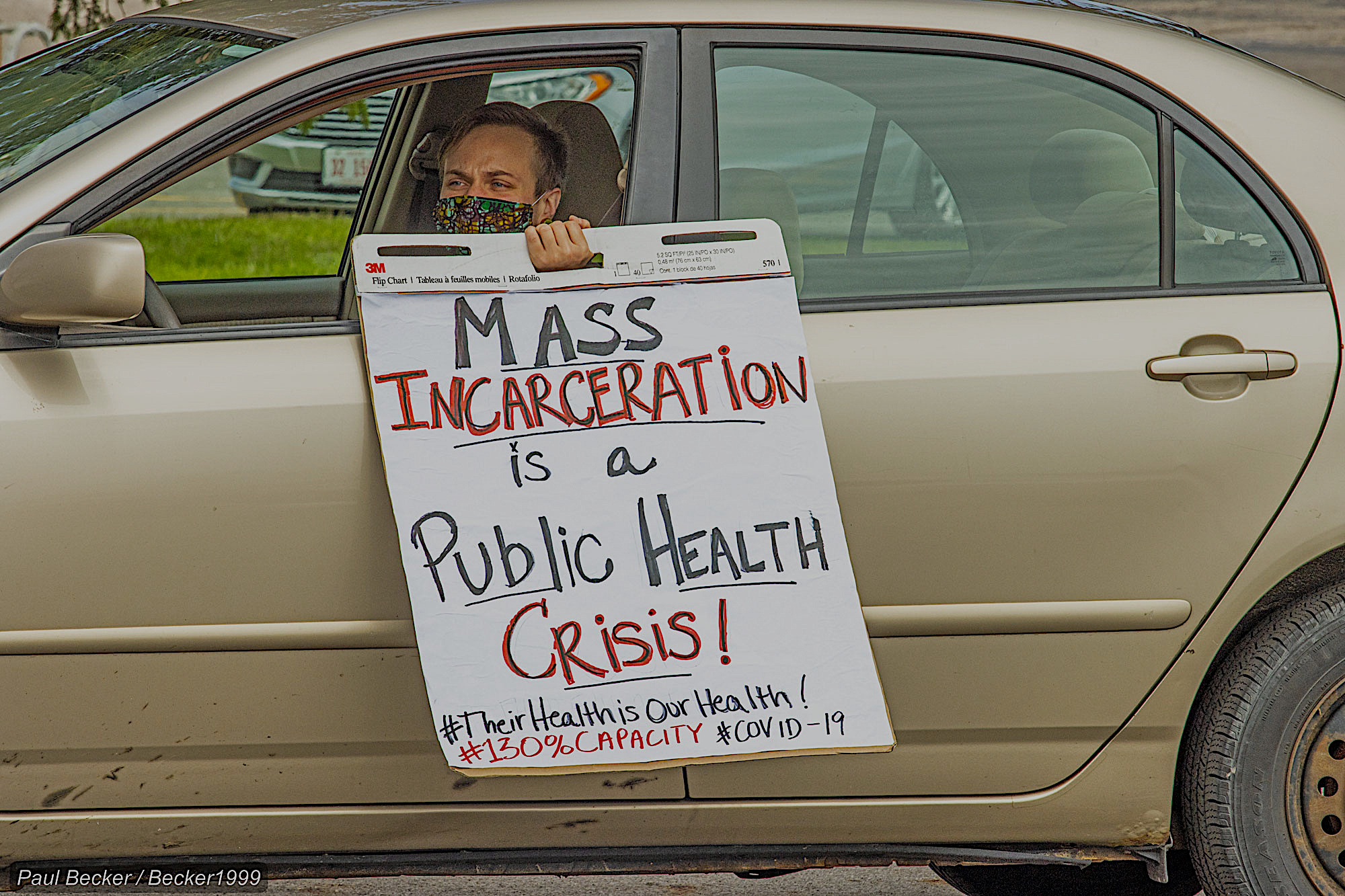
Protest event in Columbus, Ohio, April 24, 2020, calling for 20,000 early prison releases. (Becker1999, CC BY 2.0, Wikimedia Commons)
The New York Times reported in June that at the time, San Quentin, a state prison which also houses federal prisoners, had no Covid-19 cases until infected prisoners from a prison in northern California were transferred there. Just two weeks later, 2,050 prisoners at San Quentin had tested positive for Covid-19 and 12 were dead. Prison administrators never explained their actions.
The bad planning also hindered California’s firefighting efforts. Every year during fire season, minimum-security federal prison camps in the state virtually empty so that prison volunteers can fight the state’s wildfires for $10 a day.
But this year, according to Prison Legal News magazine, 12 of the 43 minimum security prisons in California were on lockdown because of the Covid-19 outbreak. Consequently, only 30 of the normal 77 prisoner-staffed wildfire crews were available to fight the fires.

Prison inmates clear a fire line near Santa Barbara, California, Dec. 11, 2017. (U.S. Air Force, Brian Ferguson)
Alec Arapahoe
Violence also continues to be a problem in the BOP.
Alec Arapahoe, a Native American, was 21 when he arrived at the BOP’s medium-security Federal Correctional Institute (FCI) in Florence, Colorado. He tried to hide his homosexuality, but another Native American prisoner, William Mexican, a gang member, had already heard that Arapahoe was gay.
Mexican attacked Arapahoe, extorted money from him, accused him of being gay and threatened to rape him. Eventually, the Native Americans at the prison met on the recreation yard and, after a disagreement that neared violence, a faction led by Mexican “voted Arapahoe off the yard” due to his sexual orientation. That meant Arapahoe had to leave the prison immediately or be beaten.
Arapahoe asked his stepmother to call the prison and intervene to help him seek protective custody status. She did, and he was placed in the Segregated Housing Unit at USP Florence, a maximum-security facility adjacent to the prison.
Staff who investigated the protective custody request found a video recording of the meeting on the yard and interviewed Mexican, who said there would be trouble for Arapahoe if he returned. They nonetheless filed a report stating they could find no evidence to support Arapahoe’s claim that he was in danger.
Mexican was later transferred to the USP and, because a staff member only looked at his paperwork, not Arapahoe’s, he was placed in a cell with Arapahoe.
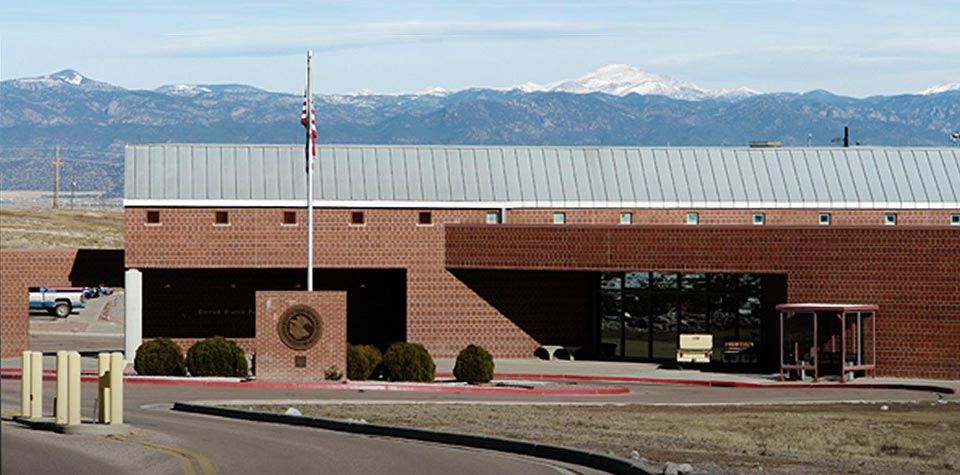
USP Florence. (U.S. Department of Justice, Wikimedia Commons)
Arapahoe told the guards who escorted Mexican to his cell that he was nervous about having Mexican celling with him, but Mexican assured them there would be no problems and they left.
Over the course of the next three days, Mexican repeatedly assaulted Arapahoe, forced him to perform oral sex and anally raped him. Arapahoe repeatedly stationed himself in front of the cell’s video camera, often covered in blood, and hit the cell’s distress button, but no one came to investigate.
Mexican forced Arapahoe to face the back wall when food was delivered, so staff could not see his injuries. Finally, Mexican left the cell to go to recreation and, as soon as the cell door closed, Arapahoe told the escorting guards he was in danger. He was moved to another cell and a medical examination yielded evidence of the sexual assaults.
An internal BOP investigation found that staff had failed to conduct cell checks every 30 minutes, as required by regulations, and had falsified documentation to show they had performed the rounds on time. The investigation sustained allegations of “inattention to duty,” “failure to follow policy” and “falsification of documents” against 26 employees. Arapahoe won $750,000 in a lawsuit against the BOP.
Earlier this year, a federal judge in New York awarded $273,246.88 to a prisoner who alleged that a guard beat him brutally and lied about the incident.
Morgan Greenburger
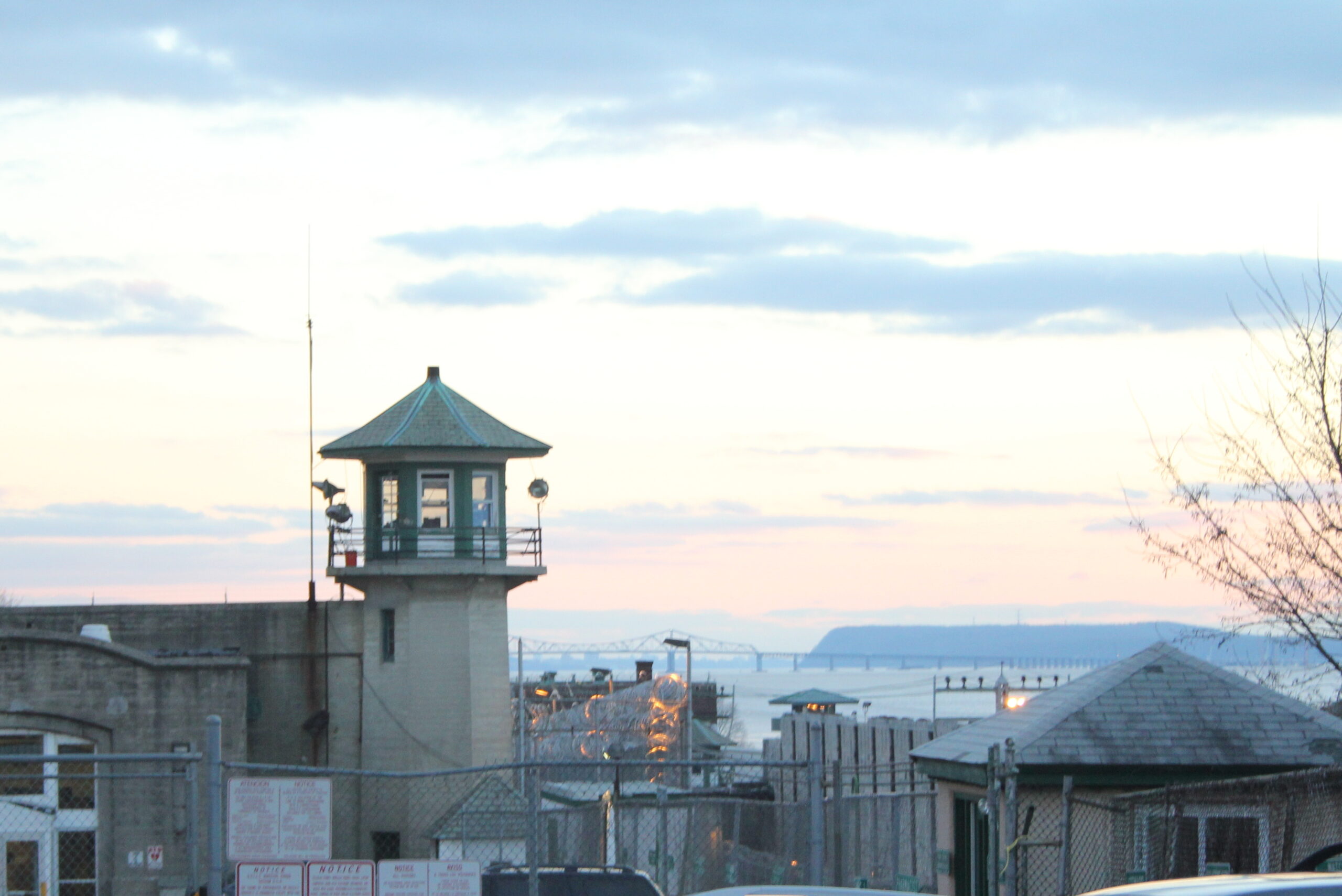
Sing Sing Correctional Facility guard tower in 2014. (Peter Greenberg, CC BY-SA 3.0, Wikimedia Commons)
Morgan Greenburger, a mentally ill prisoner, told a guard at a New York’s Sing Sing Correctional Facility that he had eaten a toothbrush and he asked to be taken to the medical unit. He was placed on “special watch,” where he was supposed to be under constant supervision so as not to hurt himself again.
Greenburger then asked guard Phillip Roundtree for a bottle so that he could urinate. Roundtree told him to wait 15 minutes. Greenburger asked again 15 minutes later, and Roundtree responded, “You sure you want it?” He then placed the bottle just inside Greenburger’s cell.
When Greenburger reached down to pick it up, Roundtree began pummeling him with a baton on the back, arms, head, and shoulders so hard that the baton splintered into pieces. Two hours later, other guards took Greenburger to a hospital, where he received five staples to close the wound on his head.
Greenburger was charged with “initiating an assault” and “refusing a direct order.” He was given 50 days in solitary confinement. Nearly a year later, after Greenburger was released from solitary, the verdict was reversed and he filed his federal action.
I could go on for another 10,000 words detailing violence against prisoners in federal prisons. The vast majority of incidents go unreported. And it’s a daily occurrence.
I wish I had a solution; I suppose the only one is in the courts. The problems within the BOP are too deep to address here.
There has to be wholesale change at the top. There has to be real congressional oversight. There has to be a president willing to go out on a limb to demand and effect change.
We don’t have any of those things right now. And I would guess that the situation will get far worse before it gets any better.
John Kiriakou is a former CIA counterterrorism officer and a former senior investigator with the Senate Foreign Relations Committee. John became the sixth whistleblower indicted by the Obama administration under the Espionage Act—a law designed to punish spies. He served 23 months in prison as a result of his attempts to oppose the Bush administration’s torture program.
The views expressed are solely those of the author and may or may not reflect those of Consortium News.
Please Contribute to Consortium News’
25th Anniversary Fall Fund Drive
Donate securely with
Click on ‘Return to PayPal’ here.
Or securely by credit card or check by clicking the red button:



“Suffering in prisons is actually counter productive to society”
The problem for the USA and many other so-called developed societies is that most of their people believe that anyone in prison should suffer as much as possible. Who questions the morality or efficacy of punishment in a prison as a consequence of causing certain kinds of harm? The choice of which actions should have this consequence seems quite arbitrary. Who’s being imprisoned for producing weapons which are killing Yemeni children? Yet we put men in prison for looking at pictures of children.
Just like the author, I’ve been in prison, but in contrast to him, my stay was short.
Can you imagine the possibility of the US getting it’s prison system aligned with the need of the citizens. I can because I can dream and you should take the dreams of mine and even moreso the author of this piece seriously when it comes to prisons because we both have been there personally. Suffering in prisons is actually counter productive to society and that is why the US prisons must either be changed for good or eliminated I reckon.
Can you imagine what Julian Assange has endured being imprisoned so unjustly? Can you even possibly imagine that? Well, if you haven’t been to prison, then you cannot imagine it like I can nor can you imagine it like the author of this fine piece of journalism. So respect that please, before you try to pass judgement.
My judgement is that there are just WAY too many folks in prison, in the US especially, and it is time for some freedom. Julian Assange committed no crime other than exposing the crimes of others. Seems like that qualifies as the “Crime of the Century” in the minds of a few, but how is it a crime to expose the truth? If that is so, then God help us all.
My fourth and final prayer:
Dearest Lord above wherever thou resides, have it in your boundless mercy to free Julian Assange. The man deserves freedom and praise for all he has done and I say this in your name my dearest Lord. I pray this day September 22, 2020 – The year of peace in my mind Lord. I pray that this is granted. But if not, in all humility, I pray it will mean that those who perpetuated this travesty of justice will learn what it means to better understand you and your mysterious ways. I trust that all will get what they deserve. In this I have faith.
BK
I’m done praying.
BK, you make me cry with your depth and compassion and understanding and generosity of spirit. I join your heartfelt prayer for Julian Assange and his loved ones and those of us who value him. Peace.
All these are the hallmarks of a failed state.
IMHO, it will get worse, much worse, and no, it won’t get better. Prisons and prison culture are part of the rapidly increasing militarization of the country, and cannot be separated from that trend. Pretty much from the founding of this country, the objective was punishment, not rehabilitation. The methods of punishment have not only became more sophisticated, but the system attracted and continues to attract an unhealthy share of sociopaths and authoritarians to run it, at every level, and that will become worse as well.
The prevailing propaganda is that, whatever happens after sentencing is part of the punishment, and that anyone convicted, or even accused of anything deserves everything they get, starting with their arrest. There is no political will, and no support from most of the public for any reform, any soul–searching, or even any studies to get at the truth and the root of the matter.
The kind of ugly incivility and violence in society now seems almost like we have become part of the Stanford Prison Experiment writ large.
“These times are so uncertain
There’s a yearning undefined
People filled with rage
We all need a little tenderness
How can love survive in such a graceless age?”
– The Heart of the Matter – Don Henley
Good article.
I’ve been reading Consortium News for about 15 years.
one of the last independent Journalists.